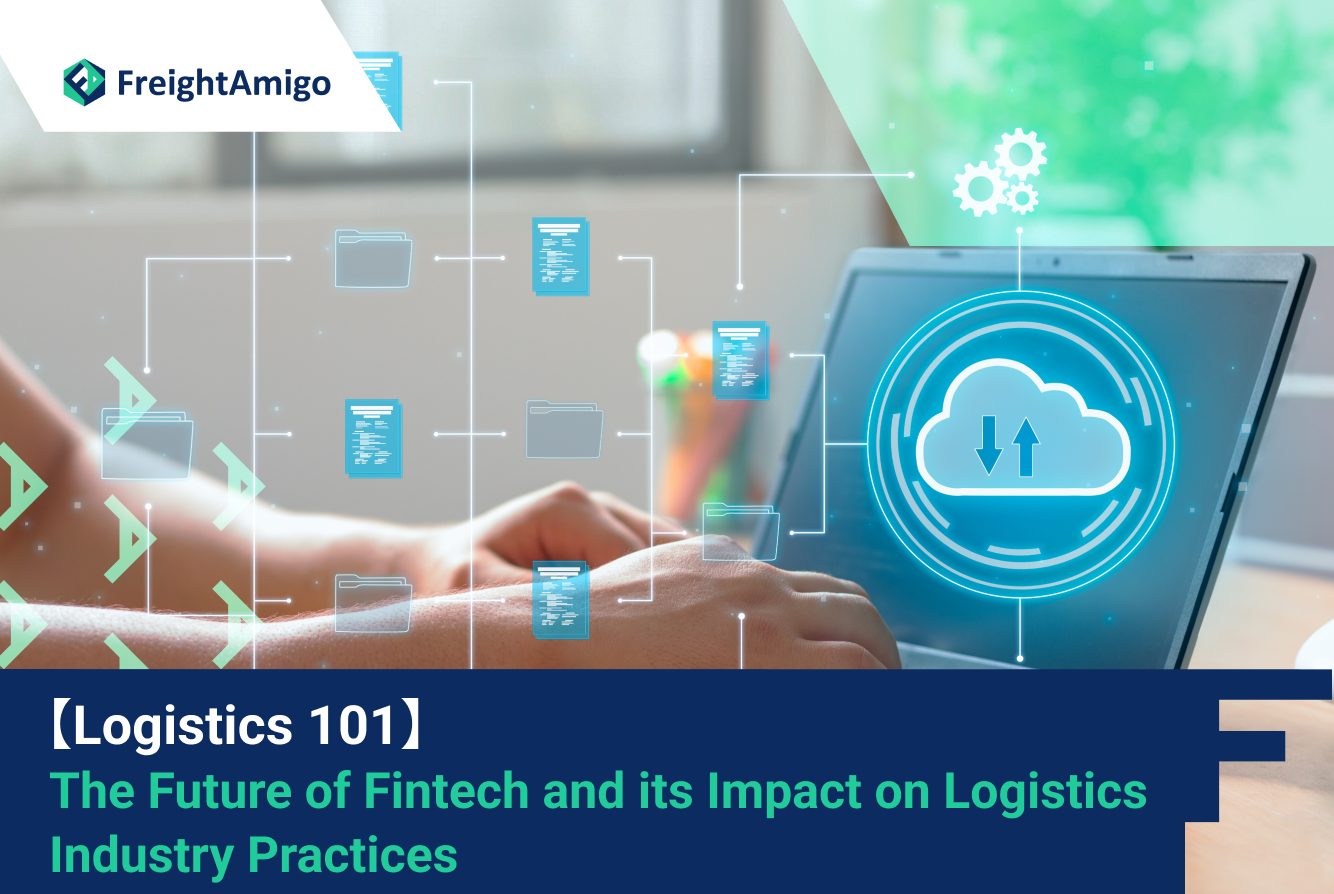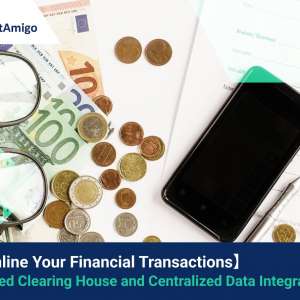Author Name: Tiffany Lee – Marketing Analyst at FreightAmigo
The world of finance and logistics is undergoing a significant transformation with the rapid advancement of financial technology, or fintech. Fintech innovations such as artificial intelligence (AI), blockchain, cloud computing, Internet of Things (IoT), open source software, and no-code/low-code platforms are reshaping the way financial services are delivered and revolutionizing logistics industry practices. In this article, we will explore the potential impact of these technologies on the logistics industry and how they can enhance efficiency, transparency, and customer experience.
Want To Compare The Best Express, Air Freight, Sea Freight, Rail Freight & Trucking Rates So As To Have Better Control On Cost?
Artificial Intelligence (AI) in Finance and Logistics
Artificial intelligence is poised to generate massive value in the global banking industry, and its applications extend to the logistics sector as well. In finance, AI can drive automatic factor discovery, improving financial modeling and analysis. In logistics, AI can optimize supply chain operations, enable predictive maintenance, and enhance demand forecasting. Furthermore, AI can power customer-facing applications such as personalized user experiences, chat interfaces, and alternative credit ratings. Middle- and back-office applications of AI include smart processes, knowledge representation tools, and fraud detection.
Banks and financial institutions are adopting an “AI-first” mindset, deploying AI technologies across the entire lifecycle of their digital operations. By leveraging AI, banks can automate manual tasks, improve operational efficiency, and gain a competitive advantage. The integration of AI in logistics can streamline processes, reduce costs, and enhance decision-making capabilities. AI-powered systems can analyze vast amounts of data in real-time, allowing for better inventory management, route optimization, and supply chain visibility.
Blockchain Revolutionizing Financial Protocols and Trade
Blockchain, a distributed ledger technology (DLT), has the potential to disrupt established financial protocols and transform trade practices. By enabling the recording and sharing of data across multiple data stores, blockchain ensures transparency, security, and immutability. In finance, blockchain can revolutionize cross-border payments, trade finance, and digital asset management. Smart contracts, zero-knowledge proofs, and distributed data storage and exchange are key components of blockchain-based fintech innovations such as decentralized finance (DeFi) and non-fungible tokens (NFTs).
In the logistics industry, blockchain can enhance supply chain visibility, traceability, and security. By recording and verifying transactions in real-time, blockchain can provide a transparent and tamper-proof framework for tracking goods, payments, and services across the entire supply chain. This can help combat counterfeit goods, fraud, and ensure timely access to information. Furthermore, blockchain can facilitate digitization and automation of customs and border clearance, reducing manual processing and improving accuracy and throughput.
Cloud Computing Empowering Financial Services Players
Cloud computing is playing a pivotal role in empowering financial services players and enabling them to scale their operations efficiently. By leveraging cloud technology, financial institutions can reduce infrastructure costs, improve platform integrity, and enhance operational performance. Cloud-based solutions offer flexibility, scalability, and cost-effectiveness, allowing financial companies to focus on core business activities and deliver seamless customer experiences.
In the logistics industry, cloud computing can provide on-demand access to storage and computing resources, enabling real-time data analysis and decision-making. Cloud-based solutions facilitate collaboration, data sharing, and integration across multiple stakeholders in the supply chain. By adopting cloud technology, logistics companies can improve operational efficiency, optimize inventory management, and enhance customer satisfaction.
Internet of Things (IoT) Driving Trust in Finance and Logistics
The Internet of Things (IoT) is revolutionizing the way financial services and logistics are delivered, driving a new era of trust and transparency. In finance, IoT applications can support environmental, social, and corporate governance (ESG) considerations, monitor industrial energy efficiency, and enable more accurate risk assessment in insurance. IoT devices can collect data on driver behavior, vehicle usage, and other parameters, allowing insurers to offer personalized premiums and improve customer engagement.
In the logistics industry, IoT enables real-time tracking and monitoring of goods, optimizing inventory management, and enhancing supply chain visibility. IoT devices, such as smart sensors and RFID labeling, can automate item identification and logistics management. IoT-based solutions can facilitate trade finance, allowing banks to develop new products based on goods flow tracking and smart contract automation. By embedding banking services into wearables and IoT devices, financial institutions can provide convenient and secure digital payment solutions to customers.
Open Source Software and SaaS Lowering Barriers to Entry
Open source software, software-as-a-service (SaaS), and no-code/low-code platforms are lowering barriers to entry for fintech startups and traditional financial institutions alike. Open source software provides free-to-use source code, enabling developers to accelerate application development and innovation. SaaS allows companies to access and use software on-demand, reducing the need for expensive infrastructure and maintenance. No-code/low-code platforms empower both programmers and general users to develop applications through graphical user interfaces and configurations, eliminating the need for extensive coding skills.
In the logistics industry, open source software and SaaS solutions enable startups to launch innovative logistics platforms and services without significant upfront costs. These technologies promote collaboration, accelerate development cycles, and foster rapid prototyping. No-code/low-code platforms empower logistics companies to develop custom applications and automate processes, improving operational efficiency and customer experience.
No-Code/Low-Code Platforms Redefining Application Development
The rise of no-code/low-code platforms is redefining application development in the fintech and logistics sectors. These platforms allow users to develop applications through graphical user interfaces and configurations, without the need for traditional coding. No-code/low-code development accelerates the time-to-market for new applications, reduces development costs, and democratizes software development.
In finance, no-code/low-code platforms enable the rapid development of customer-facing applications, such as mobile banking apps and automated investment platforms. These platforms also facilitate the integration of various financial systems and data sources, improving data analysis and reporting capabilities. In logistics, no-code/low-code platforms empower companies to develop custom logistics management systems, track shipments, and automate supply chain processes. These platforms enhance operational efficiency, streamline workflows, and enable real-time collaboration among stakeholders.
Conclusion
The future of fintech holds immense potential to transform the finance and logistics industries. Artificial intelligence, blockchain, cloud computing, Internet of Things, open source software, and no-code/low-code platforms are driving innovation, improving operational efficiency, and enhancing customer experiences. Financial institutions and logistics companies that embrace these technologies can gain a significant competitive advantage in the global marketplace. By harnessing the power of fintech, they can streamline processes, optimize supply chain operations, and deliver seamless and personalized services to customers. The future is bright for the intersection of fintech and logistics, and it promises to revolutionize the way we conduct financial transactions and manage global supply chains.
There Are Different Options For Cargo Transportation. If You Want To Choose The Most Convenient And Suitable Solution, It Is Best To Have The Full Support Of Logistics Experts! If You Are Planning To Ship Goods Overseas, Please Go To The FreightAmigo Page For Inquiries.
===
Read More:
【Export of USA】 A Gateway to Success and Global Economic Influence
The Key Trade Partners of the USA: Boosting International Commerce
【Export of USA】 US-China Trade War’s Influence on USA’s Export Industry
===
If you have any inquiries on logistics/supply chain, feel free to contact FreightAmigo now:
Chat with us online OR
Phone : +852 28121686
WhatsApp: +852 27467829









































